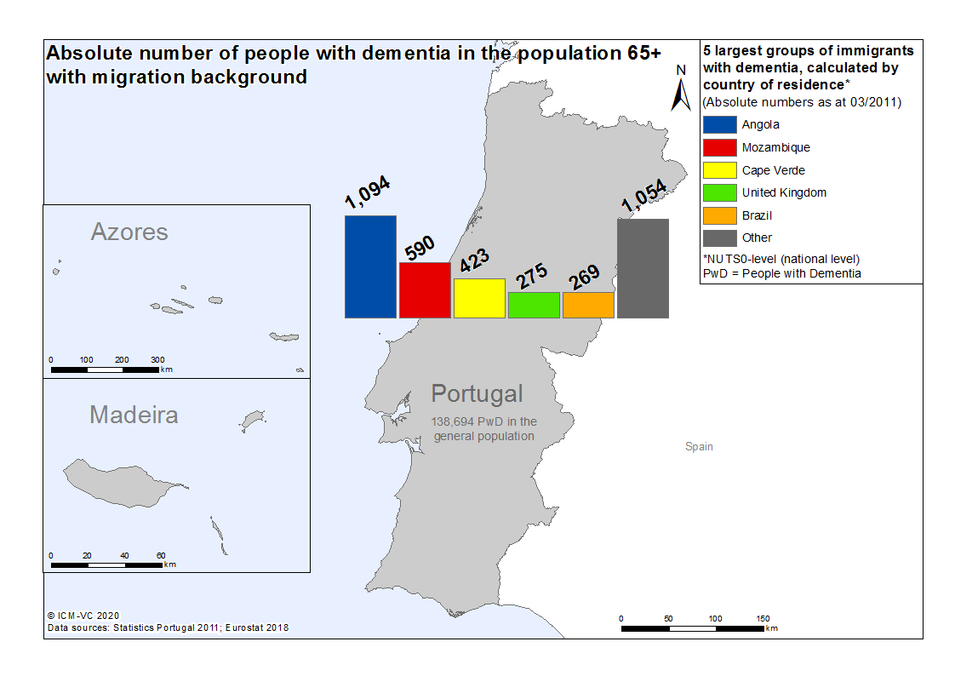EU-Atlas: Dementia & Migration
| Largest group | 2. largest group | 3. largest group | 4. largest group | 5. largest group | |
| Absolute numbers | |||||
| PwMD per 100,000 inhabitants 65+ |
| Absolute numbers | PwMD per 100,000 inhabitants 65+ | |
| Largest group | ||
| 2. largest group | ||
| 3. largest group | ||
| 4. largest group | ||
| 5. largest group |
| Prevalence per 100,000 inhabitants 65+*, calculated by country of residence | |||
|---|---|---|---|
| high > PwMD |
minor > - PwMD |
||
| increased > - PwMD |
low ≤ PwMD | ||
| medium > - PwMD |
|||
| PwMD = People with a Migration background with Dementia *Bulgarien, Litauen, Malta, Polen in der Bevölkerung 60+ |
|||
| Absolute number of PwMD 65+ | |
| PwMD per 100,000 inhabitants 65+ |
Portugal
Portugal for centuries has been a country of emigration. However, since the 1970s, it became a country with a continuous growth of immigration caused by the decolonisation processes in the PALOP (=países africanos de língua official portuguesa) states, rising labour demand and EU accession. At present, Brazil, Cape Verde, Romania, and Ukraine are the most common countries of origin1. Between 1990 and 2019, the population of the migrant population and its proportion in the total population roughly doubled (435,800 to 888,200; 4.4 to 8,7%)2.
There are 57,600 persons with a migration background aged 65 or older. Of those, approx. 4,000 are estimated to exhibit some form of dementia. The most affected migrant groups presumably originate from Angola (approx. 1,100), Mozambique (approx. 600), Cape Verde (approx. 400), Great Britain (approx. 300) and Brazil (approx. 300)3.
No formal national dementia program and a policy-driven national dementia plan were found for Portugal. However, in 2009 Alzheimer Portugal issued a ‘National Alzheimer's Plan of Intervention’, which covered topics including general information on dementia; principles, values, vision and goal of the Alzheimer's plan; interventions; legal framework; care; and research4. Moreover, by 2011, The Portuguese guideline on the ‘Therapeutic Approach to Cognitive Impairment’ was drawn, which provided recommendations on diagnosis, health and life situation assessment, treatment, and comorbidities5. In addition, in 2018, a general dementia strategy (‘Despacho n.º 5988/2018’) was launched. The strategy placed responsibility for early screening, comprehensive diagnostics and coordinate person-centred care with health and community services6. None of these three documents referred to the phenomenon of migration in general.
Portugal's healthcare strategy is based on an integrative model where people with and without a migration background and dementia have access to mainstream healthcare services. Specialised services in inpatient or outpatient care for persons with a migration background with dementia are not available.
Culturally sensitive care is not part of the professional qualification. However, there are some pilot projects aiming to incorporate intercultural care training into social work and healthcare education. There is no official data on the proportion of professional caregivers with a migration background working in inpatient and outpatient care but based on expert's perception it would be a low to moderate proportion. Overall, the need for culturally sensitive care is only met partially, if at all.
Family, religious institutions, small migrant associations, and service providers play a significant role in supporting family caregivers, providing information and facilitating access to social and health services. There are a few services for people without a migration background and none for persons with migration background. Therefore, there is a very high need for specialised services for family caregivers of persons with a migration background with dementia.
References
- SEF: Report on Immigration, Borders and Asylum 2018. In. Edited by SEF, GEPF. Lisboa; 2019.
- International Organization for Migration: International migrant stock as a percentage of the total population at mid-year 2019: Netherlands; 2019.
- Statistics Portugal: Population and housing census: 2011. Lisbon: Statistics Portugal 2011.
- Alzheimer Portugal: Plano Nacional de Intervenção Alzheimer; 2009.
- Directorate General of Health, Ministry of Health: Abordagem Terapêutica das Alterações Cognitivas; 2011.
- Office of Assistant Secretary of State and Health: Estratégia da Saúde na Área das Demências. In. Portugal: Diário da República; 2018: . 17096–17101.



![[Translate to Englisch:] Logo RBS [Translate to Englisch:] Logo RBS](/fileadmin/_processed_/9/7/csm_RBS_Logo_RGB_0e245a98a4.jpeg)